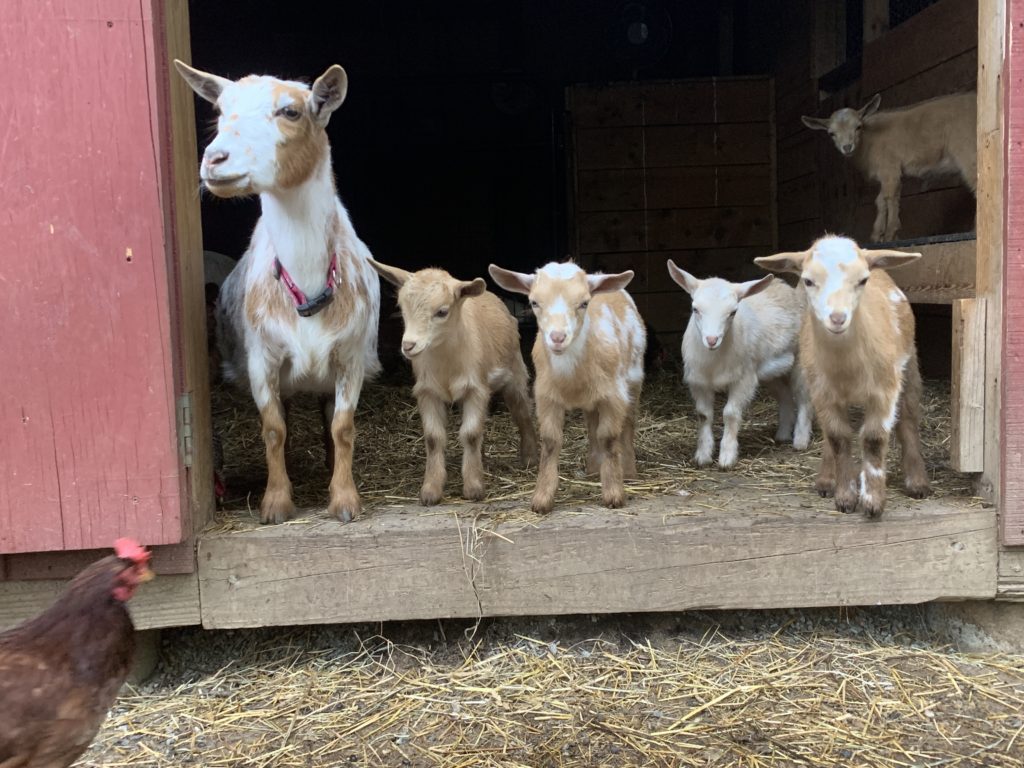
Goat Care
Below is some information on how we at Harmony Farms care for our Goats. Please note I am not a veterinarian. Below is a brief description on how we care for our goats.
Here at Harmony Farms, we believe in maintaining our animals immune system in order to prevent illness. We do this by: -*Adding apple cider vinegar to their water a couple of times a week as well as adding fresh chopped garlic to their water once a week. (We do not add them on the same day) Additionally, we have a second fresh water available for them. We give copper bolus once every 6 months (each goat is different. You may find one goat needs it more often than another.) During the fall and spring when they are changing coats, I give them human zinc tablets daily for a few weeks. This helps their skin not get dry and flaky and helps with their shed.
Worm/coccidia: We treat all of our babies with a coccidia prevention before they go to their new homes. It is a good idea to run fecals on your goat before deworming to ensure that you are only deworming when necessary. Worms will build up resistance if you are continually deworming. Also, not all dewormers treat every type of worm so you want to ensure that you are using the right treatment. We like to use natural supplements to prevent worm overload. wormwood, and black walnut are great natural options (do not give to pregnant goats) A stressed goat is much more susceptible to worm overload.
Although people think goats can eat anything, that is not true. They are actually quite picky and will eat a little of this and a little of that. Also, there are many plants that are poisonous to goats. These plants include: the night shade family, hemlock, hydrangea, Ivy. (you can google a complete list) In the event your goat is poisoned by a plant, have activated charcoal on hand to administer with a charcoal/water solution using a syringe.
I recommend to everyone that is on Facebook to join the group “Goat emergency Team” This is an amazing group with moderators that are super knowledgable and can talk you through emergencies. They also have a ton of files to read through to prepare you for any emergencies that may arise.
Feeding: The most important thing for goats to have is fresh hay and clean water at all times. They don’t like when hay is on the ground or there is debris in their water. For bucks and wethers, if you are graining them, ensure that the grain contains Ammonium Chloride to prevent kidney stones.
Bucks: Poulin Goat pellets with Ammonium Chloride or Poulin grain meat goat pellet. Black oil sunflower seeds are given in moderation 1 to 2 teaspoons once a week.
Does: Poulin dairy goat pellet as well as Poulin Sweet Feed textured grain, black oil sunflower seeds as well as beet pulp shreds. I mix a 5 gallon bucket at a time with a ratio of 4 dairy goat scoops, 3 sweet goats scoops, 1 black oil sunflower scoop and 1 beet pulp scoop. Goats not in milk don’t need a lot of grain. I would give them 1/2 cup of grain daily. Pregnant does or does in milk need about 2 cups per day. Each doe is different and you can adjust feed accordingly.
It is important to know what deficiencies your soil has. In Connecticut we are deficient in selenium so I suggest a selenium block to ensure your goat gets that nutrient
Goat first aid: Activated charcoal, Red cell, Vitamin B complex, antibiotic (if available), Probios, alushield, Sodium chloride, thermometer, thermometer probe cover,gloves, syringes.
*This website contains affiliate links. For more information, please visit our about page.
Last updated Oct. 14th 2024
